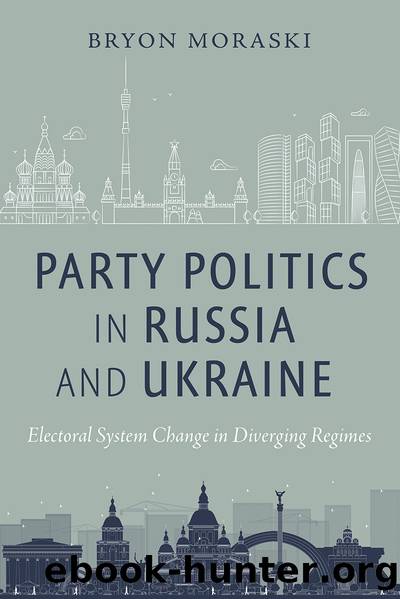Party Politics in Russia and Ukraine by Bryon Moraski;

Author:Bryon Moraski;
Language: eng
Format: epub
Publisher: New York University Press
Conclusion
A primary goal of this chapter has been to systematically compare the nominations of incumbent legislators by Russiaâs ruling party with those made by the pro-presidential party and a primary opposition party in Ukraine during the two countriesâ first PR-only elections. Since the two countries employed closed-list PR for the first time in regimes with significantly different levels of electoral competition, few would be surprised to learn that Russian and Ukrainian parties might have behaved differently from one another. However, since all parties, regardless of regime type, are interested in winning elections and establishing majority control over the legislature, one might also reasonably expect some commonalities across the parties to emerge. The only way to know which kinds of behavior reflect the fact that parties are operating in democratic rather than authoritarian regimes (or vice versa) is to explicitly compare how parties in both types of regimes respond to similar changes. The study of the electoral system changes in Russia and Ukraine provides such an opportunity.
The preceding analyses reveal that parties will likely navigate the move to closed-list PR by reinvesting in a core of seemingly loyal and experienced deputies. As observed above, incumbent deputies, both district and list, were consistently more likely to be nominated by one of the parties during the first closed-list PR elections if the deputies were previously nominated by the party in question. This finding holds regardless of whether the parties are pro-presidential or opposition and regardless of whether the parties are in an increasingly authoritarian regime or in a regime where elections were hotly contested. Likewise, it appears that all partiesâregardless of regime type and status (i.e., pro-presidential or not)âvalue the legislative experience of incumbent deputies; again; this holds for deputies with either district or list mandates. Although the effect of this variable fails to attain significance in one model (the model comparing the nomination of list deputies by United Russia and the Party of Regions), the null finding in this case likely reflects the significant effect of prior party membership among list deputies, which itself can be expected to have determined the allocation of key positions in the outgoing legislature.
The analyses also yield insight into the degree to which parties may view party affiliation differently. At least for the cases under investigation, which again operate in weakly institutionalized party systems, previous party affiliation among list deputies (i.e., the only deputies for whom party membership data are consistently available) in the form of a prior party nomination is not the same thing as party membership. As that particular analysis highlights, prior party membership mattered to United Russia and the Party of Regions but not to Our Ukraine. Since Our Ukraine and United Russia constitute the two pro-presidential parties, and the Party of Regions and United Russia competed in different regimes, this finding cannot be explained as resulting from pro-presidential status or as a regime-type effect. With this in mind, the importance of party membership to nomination decisions during periods of electoral system change should be understood as a party-specific concern and as one that can span regime types and party status.
Download
This site does not store any files on its server. We only index and link to content provided by other sites. Please contact the content providers to delete copyright contents if any and email us, we'll remove relevant links or contents immediately.
| Antitrust | Civil Law |
| Emigration & Immigration | Federal Jurisdiction |
| Housing & Urban Development | Indigenous Peoples |
| Land Use | Public |
| Public Contract | Public Utilities |
| Urban, State & Local Government |
Killers of the Flower Moon by David Grann(3753)
Machine Learning at Scale with H2O by Gregory Keys | David Whiting(3640)
Oathbringer (The Stormlight Archive, Book 3) by Brandon Sanderson(2639)
Will by Will Smith(2581)
Once Upon a Broken Heart by Stephanie Garber(2529)
Guns, Germs and Steel by Diamond Jared(2201)
Borders by unknow(2119)
It Starts With Us (It Ends with Us #2) by Colleen Hoover(2044)
The Room Where It Happened by John Bolton;(2034)
Friends, Lovers, and the Big Terrible Thing by Matthew Perry(1998)
The Color of Law by Richard Rothstein(1821)
HBR's 10 Must Reads 2022 by Harvard Business Review(1698)
The Strength In Our Scars by Bianca Sparacino(1695)
A Short History of War by Jeremy Black(1671)
Water Rights and the Environment in the United States by John Burch(1607)
Examples & Explanations: Administrative Law by William F. Funk & Richard H. Seamon(1550)
515945210 by Unknown(1521)
Pharmacy Practice and The Law by Richard Abood(1495)
That Every Man Be Armed by Stephen P. Halbrook(1479)
